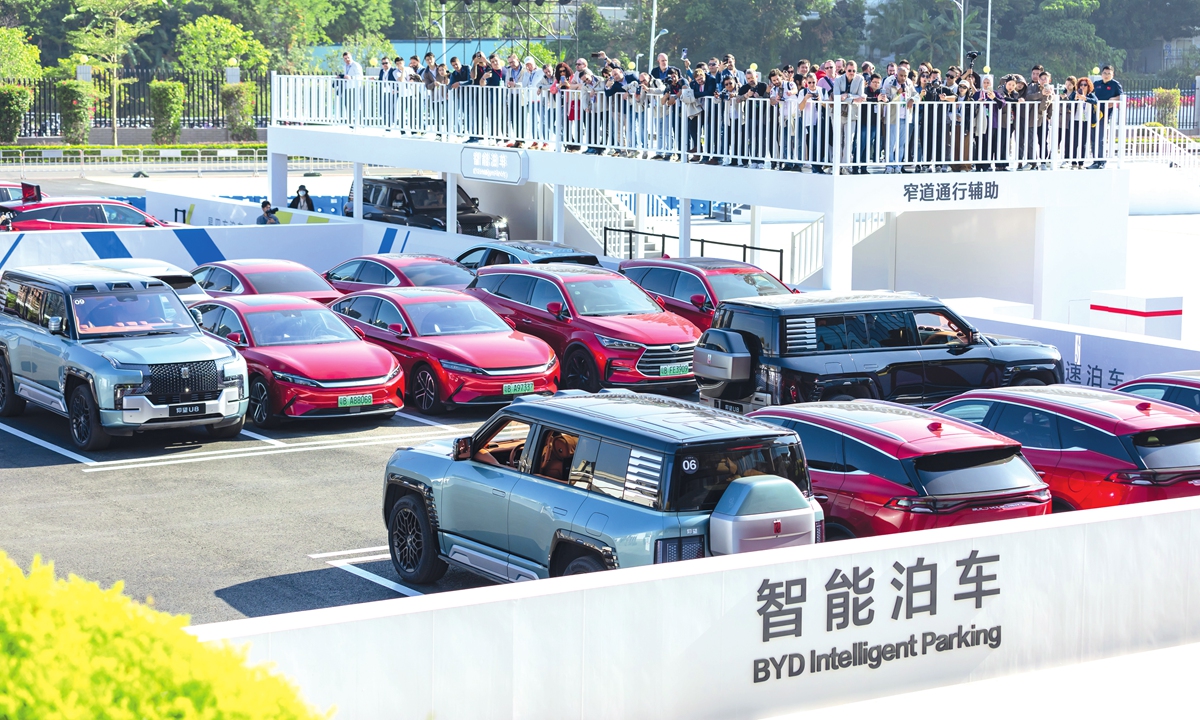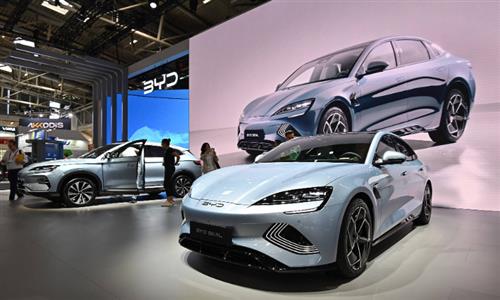Chinese automakers gear up for global intelligence race by building on strengths in high-end international market

A demonstration zone showing BYD's intelligent parking in Shenzhen, South China's Guangdong Province Photo: Courtesy of BYD
When Elon Musk's Tesla lost its crown as the largest electric vehicle (EV) maker to Chinese automaker BYD in the fourth quarter of 2023, the American billionaire said at that time that "Tesla is an AI/robotics company," trying to draw a difference between the technologies developed by the Chinese and US companies.
Will the difference Musk identified still persist?
It is believed that the divergence would be narrowed down or even closed this year, according to Chinese automakers, who have been gearing up in the global auto intelligence race since the beginning of 2024, after the industry hitting multiple milestones last year.
Industry observers stressed that China's auto industry is poised to see an "explosive growth" in intelligent system development this year, which they predict will help domestic vehicle firms to build more advantages in high-end international market as the cost of global new energy vehicles (NEVs) continues easing this year due to the mass production effect.
Making big splash
Earlier this week, BYD released its brand-new AI-powered intelligent architecture, Xuanji, which the company claimed is the industry's first electro-intelligence fusion model of its kind, at a press briefing in Shenzhen, South China's Guangdong Province where BYD is headquartered.
Xuanji is a whole-vehicle intelligent structure that is composed of a self-developed smart brain, a dual artificial intelligence (AI) large model both inside the vehicle and in the cloud - also the industry's first AI large model application in whole vehicle - as well as four "chains," namely sensor, controller, data and mechanical system. The architecture could eventually be connected to three networks, namely internet of vehicles, 5G and satellite network.
The structure enables dynamic adjustments to various hashrate modes in accordance with demand, and thus would allow a seamless switching between different modes and accommodation to future algorithm models.
BYD said at the press briefing that its accumulation at the electric field has laid a solid foundation for its intelligent driving systems, which is "the second half court battle in the new-energy race." The company announced it has assembled a team consisting of over 4,000 engineers in intelligent driving field.
The Global Times reporter took a ride in a BYD model using the "Navigate on Autopilot" (NOA) function on Tuesday. During a 45-minute ride, the vehicle deployed multiple autonomous functions in its drive in downtown Shenzhen, such as automatic traffic light identification, automatic steering at road junctions, and autonomous overtaking as well as yielding to pedestrians and two-wheeled vehicles.
The Global Times reporter also observed that the NOA system is still not fully capable of dealing with complicated road conditions such as vehicle lineup in the roadside and a sudden unexpected overtake by another vehicle, and the car control needs to be taken over by a human driver in those cases.
Likewise, a number of Chinese automakers and NEV start-ups have been making big splash on the rising automotive field.
Chinese tech company Huawei has set up a new smart car company in mid-January 2024, with a registered capital of 1 billion yuan, after rolling out its first generation of electric sedans last year. The new firm will focus on the "manufacturing and sales of intelligent car systems and equipment," according to corporate data provider Tianyancha.
Chinese EV start-up Xpeng plans to expand nationwide the use of its X NGP (Navigation Guided Pilot) software by the end of 2024, according to a report by the South China Morning Post. The smart driving system has been rolled out in 243 Chinese cities to date.
It is expected that nationwide, the number of vehicles equipped with NOA will rise by 141.43 percent to 1.69 million units in 2024, said another report by Alberta-based Western Securities.
'Still a gap'
China's car output exceeded 30.16 million units in 2023, up 11.6 percent year-on-year, and sales exceeded 30.09 million units, up 12 percent, according to latest data released by the China Association of Automobile Manufacturers, having set new records in both production and sales. The country also dethroned Japan as the world's top vehicle exporter, fueled by a jump in NEV technologies.
"To maintain the edge, it is important that Chinese automakers need to scale up efforts in intelligent driving," a veteran engineer specialized in intelligent driving told the Global Times on condition of anonymity.
He noted that while China has a manufacturing edge, there's still a gap between Chinese companies and foreign firms in certain intelligent techniques such as autonomous driving technologies, partly because of the foreign firms' first-mover advantage that helped their companies to collect a lot of vehicle data.
Tesla is still a forerunner in smart driving. It is reported that Tesla's full self-driving (FSD) version 12 is nearing public release. The beta is described by Musk as an "end-to-end AI" with a "photon in, controls out" approach, emphasizing its capacity to make complex decisions in real-world scenarios.
The anonymous engineer explained that the homegrown smart driving systems still face a bunch of barriers as the road situation in China is sometimes more complicated than in overseas markets.
Feng Shiming, a car analyst from Menutor Consulting, told the Global Times on Sunday that Chinese automakers are set to open a different technological road map with Tesla.
"Tesla's self-driving capacity is mostly built upon high hashrate and integrated algorithms, whereas Chinese firms' NOA systems are powered not only by hashrate and algorithms but also cost-effective laser radars, which provide more throughout and precise picture on the road traffic. This could render Chinese enterprises, [though having started late], an advantage in global white-hot competition," Feng said.
Chinese authorities have been rolling out a number of policies to encourage autonomous driving in the world's largest auto market. In November, it issued a regulation allowing road trials of intelligent connected vehicles, which is deemed as helping pave the way for the commercial use of autonomous driving in China.



